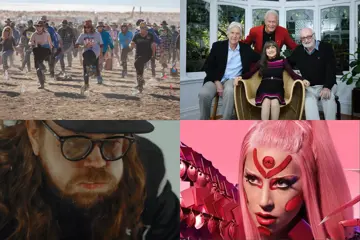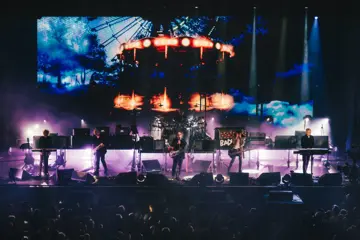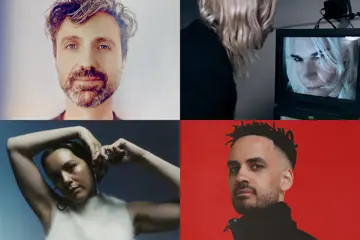Culture and community are powerful forces that shape and influence individuals. One individual that has been always been incredibly open and honest about her parallel cultural contexts is EMILY WURRAMARA. Emily has grown up for most of her life between two very distinct and diversely different communities. While Emily Wurramurra calls the Bickerton Islands home, the inner city of Brisbane has also played a part in shaping and inspiring her music too.
Emily's music has played a massive role in empowering and inspiring her community. Wurramara has always been a strong advocate for many causes such as environmentalism, and the important of Indigenous communities maintaining pride within their identity.
Having just released her debut album MILYAKBURRA, we chatted with Emily Wurramara to talk about what inspired this amazing body of work, and how important song writing has been as an expression to help preserve and pass on Anindilyakwa language and culture.
Tell us a bit about what it's been like growing up between the city as well as your Indigenous home on Bickerton Island?
It’s been like growing up in two different worlds, and with two different perspectives. Growing up in the Islands, it’s a lot more relaxed and a bit breezy. But when you’re in the city, it's always more fast paced, you're always more busy.
Don't miss a beat with our FREE daily newsletter
Indigenous music has obviously influenced your sound a great deal, are there any other contemporary genres or artists that have also inspired your music?
Growing up, I wouldn’t say that I ever really aspired to be an artist. There are very particular genres that I have been influenced by, for example jazz, and soulful RnB genres. I really wanted to incorporate some of those sounds into my music.
Songlines are important oral tradition for the preservation and passing on indigenous histories, in what ways has making songs helped with the preservation of your own history and your communities stories?
Music has been a great a tool to educate and to archive and preserve language. I think music is a really great way to do it because of the melody, because melodies really resonate with you, and get stuck in your head. I try to use music as an educational tool. When songwriting, it can get pretty difficult translating from English to Anindilyakwa because it’s not a written language, it’s an oral language that is communicated between each generation by spoken word.
Do you find the English language to be restricted in terms of expression compared to Anindilyakwa?
Anindilyakwa is a lot more emotional. The way in which we speak has its own emotional melody in a sense, using various tones and different notes to express emotion. Pitch plays a massive role in expression, our native language is often impulsive and you can often say the same words with different inflections.
Are you ever wary or conscious about how you communicate to audiences in Anindilyakwa?
It’s always been something I have been conscious of because my language is very significant to me. It's always been something that I’ve been trying to archive, and preserve for future generations. So in that sense, it’s always been important for me to get right.
How has it been for you, to be able to bring your language and culture to such broad and diverse audiences?
I think it’s amazing having been on a platform where I have been able to express and to be proud of my identity. In regards to being broadcasted nationally, it’s a huge achievement, not only for me but, for my people and for everyone that’s involved. It’s been quite a journey.
Your 2016 EP Black Smoke was a real break through moment for you, and helped establish your presence - can you tell me a bit about how you were feeling at this time and how your first EP came together?
I was very nervous, I was some random girl that came up out of nowhere and I hope you like it. It was very daunting to see how people acknowledged the songs. But it was really amazing hearing all the feedback and seeing everyone's kind comments. It was a turning point where I started to think that maybe I could do this as a career and that I could pursue this, which was a big milestone for me.
Aside from a growing fan base, you also received quite a lot of critical acclaim for your Black Smoke EP, how important was it for you to be recognised by the industry and your peers when you took home your first Queensland Music Award?
In the music it’s a lot about networking and those connections that you have, not just with industry but with the artists as well. So being able to be recognised on that platform by other artists and by the industry is huge. It was a wow moment for me, I’m just this little person, from a little Island in the middle of nowhere.
What’s been a pinnacle live performance moment for you so far?
At this point in time, the most highlighted performance that I’ve had was at Woodford Folk Festival in 2017. That was absolutely amazing, we had an encore to ‘Ngarrukwujenama’ which was the first song to be released off the new album. We had so much fun with it. We got up and had a bit of a dance, and some of the elders even came up and joined me on stage. It was very special and touching to see everyone come up and gather together and sing along to 'Black Smoke', it was beautiful.
Sung in both English and Anindilyakwa, Milyakburra explores the contrasting themes of the two worlds that you grew up in, what are some of the key feelings or messages that were you trying to convey with this album?
Milyakburra is a very sacred island for me and my people. I really wanted this album to be a dedication to home, to my childhood, and to the stories that I have come across on my journey. It was really important for me to take these messages and feelings to a platform where I felt that I could advocate for things. I am huge advocate for protecting the land and the sea, and for protecting culture. I wanted to portray that in these songs, not just in the lyrics but also in the arrangements. I tried to utilise a lot of different instruments as well, to be able to express those emotions and stories.
You really incorporated a lot of sounds of your family and community on Milyakburra, can you tell us a bit about the extra special collaborations you have included on the album?
It was incredibly special to be able to include my family in this, because it’s a tribute to my home and it’s a tribute to my people. I really wanted that to be a part of it. We’re the kids from Milyakburra, that sing on the track 'Milyakburra'. We’ve got My Uncle Enoch who’s singing on ‘TITLE’. Also my Great Grandmother who features on ‘Carry Me Home,’ and the artwork is done by my Grandmother, it took her three years to complete that artwork, and she died a few months after she completed it, so I thought it was be really special to be a part of it.
You’ve got a tour coming up next week too with ALICE SKYE, how special is it going to be touring the country with Alice?
It’s phenomenal to see another sister in the industry that is doing so well, she’s just a beautiful human being. Alice’s music is out of this world, so soothing and calming. It’s going to be a really magical tour, we’ve got a lot of collaborations and special guests that are going to be coming on board for our shows, so I’m really looking forward to that.
Catch Emily Wurramara playing around the country...
Thurs 14th June – Sol Bar, Sunshine Coast - River Eylandt Tour w/ Alice Skye - Tickets
Fri 15th June - Milk Factory, Brisbane - River Eylandt Tour w/ Alice Skye - Tickets
Sat 23rd June - Yirrkala Yarrapay Festival, NT - More Info
Thurs 28th June – Waywards, Newtown - River Eylandt Tour w/ Alice Skye - Tickets
Sat 30th June - Neil Finn Support – HOTA, Gold Coast - SOLD OUT
Fri 6th July - Wesley Anne, Melbourne - River Eylandt Tour w/ Alice Skye - Tickets
Sat 14th July - Railway Club, Darwin - River Eylandt Tour w/ Alice Skye - Tickets
4-8 Aug - GARMA Festival, NT - More Info
Fri 10th Aug - 2018 Telstra NATSIA Awards - More Info
Words by Rosie Rae
SEE ALSO
EMILY WURRAMARA'S VOICE IS SERENE, SUBVERSIVE AND NECESSARY ON 'NGARRUKWUJENAMA'

















